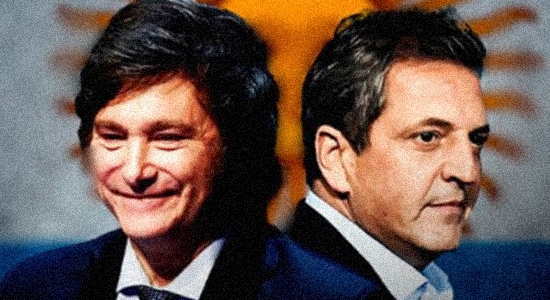
Javier Milei, a sharp critic of China’s totalitarian state who describes himself as a classical liberal and libertarian, is in a runoff for Argentine president with pro-China candidate Sergio Massa, whom the press calls a centrist.
Massa (above right), Argentina’s current Minister of Economy, whose track record includes helping the Argentina government to take over private pension funds, won a plurality of 37% of the vote in the presidential election held on October 23, 2023. Since no candidate garnered a majority and Milei, with 30%, did second-best, the two will square off on November 19.
According to VOA News:
Argentina’s battered economy was a key focus in the race in a country that has seen poverty rise and inflation surge into the triple digits under Massa and other current government officials’ watch. If [Massa] wins a runoff next month, analysts say it’s not likely that China’s ambitious economic and strategic plans for the second largest country in South America will get the scrutiny some want . . . .
Placing second was Javier Milei, an anti-establishment contender who called China an “assassin” in a Bloomberg news interview in August and pledged to freeze relations with Beijing if elected. . . .
Over the years, China has inked strategic deals with successive Argentine administrations and used currency swap agreements and other lending measures to simultaneously bail out Argentina and entrench it deeper in debt to Beijing, analysts tell VOA. Those deals have raised red flags among lawmakers and presidential candidates alike. . . .
[Massa was] the only one of the three top candidates to embrace China’s invitation to join BRICS, a bloc of major emerging economies that includes Brazil, Russia, India, China and South Africa and which often presents itself as a counterbalance to traditional Western influence.
Buenos Aires Times suggests that “Economy Minister Sergio Massa’s surprising Sunday comeback was in no small measure influenced by the social programmes he expanded on the eve of the election.”
Javier Milei (above left) says: “I will never go against private property, I will never go against freedom, I will never raise a tax, I will never create new taxes.” Routinely slam-labeled “far right” in the press, he tells Liberty magazine that he
rejects the use of the far-right label to describe his views and says, “I’m a classical liberal and libertarian. . . . [F]or the left, everything that is not on their side is on the right,” and adds that he’s a minarchist and anarchocapitalist. He clarifies his admiration for Donald Trump and Jair Bolsonaro by saying that anyone who is against socialism and “social justice” is an ally. All other policy positions are up for debate. One example of this nuance is his advocacy of free and open trade with the world, except for socialist countries. About China, Milei said: “People are not free in China, they can’t do what they want, and when they do it, they get killed. Would you trade with an assassin?” But he clarifies this position with a libertarian twist—he’s talking about government-to-government trade; individuals and businesses can trade with whomever they wish.
There are a couple of ambiguities here.
For one, it’s unclear what Milei means by saying, if he does, that he’s both a “minarchist” and an “anarchocapitalist.”
In the parlance of libertarian theorists, a “minarchist” is an advocate of limited or minimal government, of government that is restricted to protecting life, liberty, and individual rights—as opposed to government that also or instead assumes a welter of welfare, regulatory, and other functions that necessarily entail routine violations of individual rights. In the minarchist’s view, a minarchist society is ideal. An “anarchocapitalist” is a libertarian anarchist, i.e., a libertarian and pro-capitalist who believes that it is feasible for a free society to exist stably without a government and who regards such a society as the ideal. One can’t subscribe simultaneously to both of these views of what a fully just society would look like with respect to government. But one can regard a “minarchist” society as a necessary way station — for how long, unknown — on the road to the proposed “anarchocapitalist” society. I kind of doubt that Milei is any kind of anarchist, however.
The Liberty article points to a more urgent question, though. Milei says, in Liberty’s summary, that he opposes only “government-to-government” trade with China but that individuals should be able to trade “with whomever they wish” in China. Much of the trade between private western companies and nominally private Chinese companies directly abets the predations of the Chinese government. An example is China’s censorship and surveillance software, which western tech firms have helped develop, and which the Chinese government has used and will use to oppress Tibetans and Uyghurs, among others. Does it matter whether western tech firms worked only with “private” Chinese firms on the software, which was then used by the Chinese state to facilitate its tyranny, or worked directly for the Chinese state, which then used the software to facilitate its tyranny?
Thus, what distinguishes “government-government” trade and “private-private” trade in the context of China isn’t an esoteric Nozickian-Rothbardian theoretical question the resolution of which can be deferred to the far future. If Milei makes it to the presidency, everything about what to do about China will be on his desk on day one.
Still, Liberty’s reporting on Milei depicts a candidate who generally defends freedom, rejects socialism, and wants to avoid avoidable dealings with a totalitarian government like China whose “help” comes with many destructive strings attached. Milei says that he wants to extricate Argentina to the extent possible from the web of China-provided welfare and China-imposed debt, whereas Massa apparently sees no problem with such enmeshment. On this question, at least, Argentinian voters are being presented with a fairly stark alternative: more freedom versus more subjugation.





